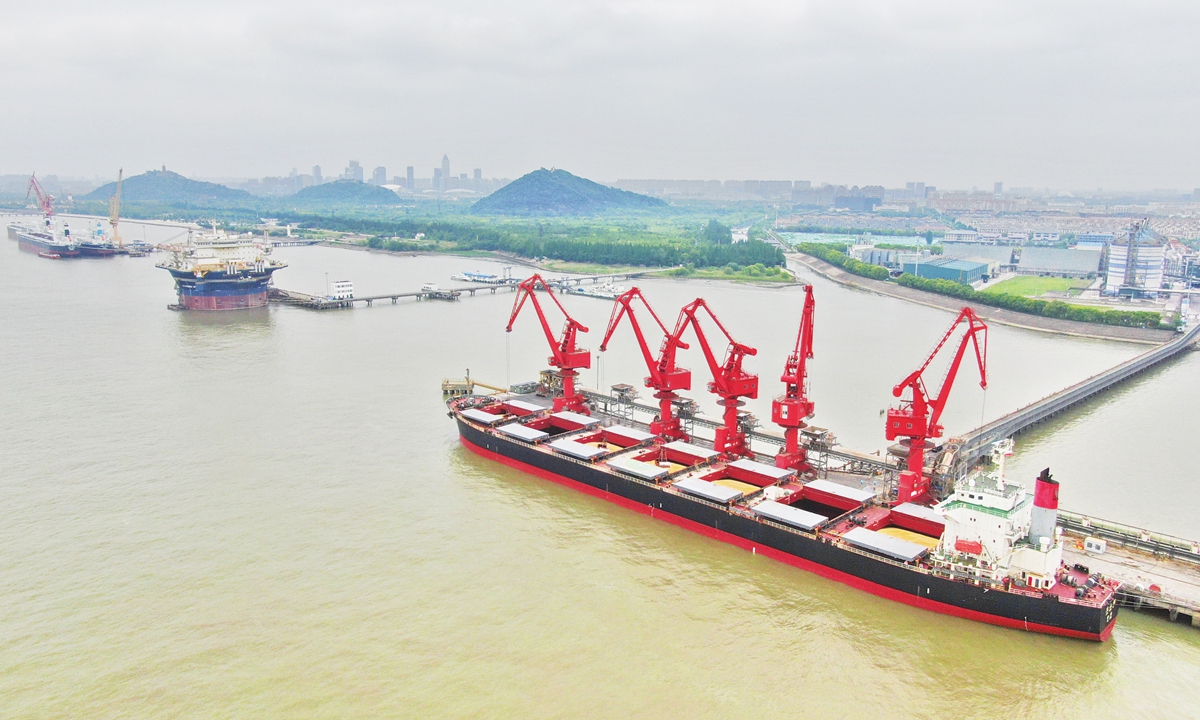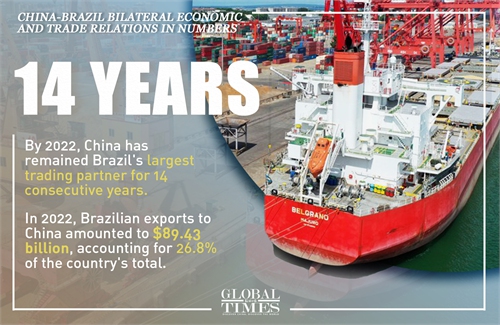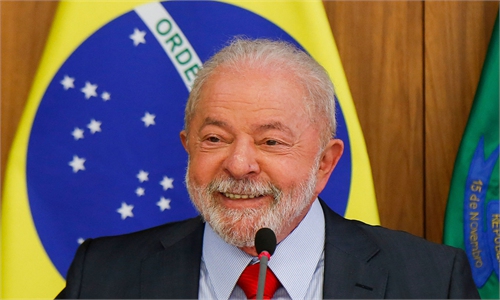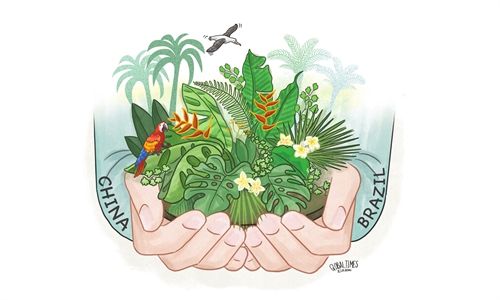China, Brazil face great opportunity for deepening strategic partnership, trade, and poverty reduction: former Brazilian minister
China, Brazil contribute to more inclusive, prosperous global order in upholding multilateralism: Brazilian ex-tourism minister


A file photo of a cargo ship carrying 54,000 tons of imported Brazilian soybeans at a terminal in Nantong, East China's Jiangsu Province Photo: VCG
As Brazil's President Luiz Inacio Lula da Silva makes his state visit to China, a trip of potentially huge significance for bilateral cooperation between the two countries, ties between the two nations are brought under the spotlight once again.
Pragmatic cooperation between China and Brazil has made great strides in recent years in the fields of manufacturing, energy, infrastructure, and agriculture, and the development of local currency settlement in cross-border trade, a move toward de-dollarization, has also attracted wide attention.

Alessandro Golombiewski Teixeira Photo: Courtesy of Teixeira
As Brazilian President Luiz Inacio Lula da Silva embarks on his highly anticipated visit to China, this historic occasion presents a unique opportunity to revive and strengthen the long-standing relationship between the two countries. With both leaders, Chinese President Xi Jinping and President Lula, sharing a people-centered, humanitarian vision for their respective nations and the world, the stage is set for deepening their strategic partnership in international forums, enhancing trade, and working together on poverty reduction and scientific cooperation.
A significant development in the Brazil-China trade relationship is the recent agreement allowing for direct large-scale trade and financial transactions between China and Brazil, Latin America's largest economy. This agreement enables the conversion of the Chinese yuan to the Brazilian real and vice versa, bypassing the need for the US dollar. This action could lower costs, help small- and medium-sized enterprises to conduct trade without needing to go through the international financial system, promote greater bilateral trade, and stimulate the expansion of investment.
China is Brazil's largest trading partner, with bilateral trade reaching $171.49 billion in 2022. Under the first mandate of President Lula in 2003, trade flow between the two countries was around $6 billion. Currently, however, Brazil is China's largest investment recipient in Latin America, primarily in high-voltage transmission lines and oil exploration.
Both countries have a strong commitment to multilateralism, and their cooperation in international forums is essential for the upholding of a rules-based global order. By working together within the framework of organizations like the BRICS mechanism, the UN, the WTO, and regional blocs, Brazil and China can contribute to a more inclusive and prosperous global order.
Poverty reduction is a key area in which Brazil can learn from China's experience. By collaborating on development assistance, technology transfers, and capacity building, Brazil and China can contribute to the global effort to eradicate poverty, reduce inequality, and protect the environment. This cooperation can also help Brazil implement more effective public policies that directly benefit its citizens, reflecting the shared humanitarian vision of both leaders.
The prospects for China-Brazil economic relations could not be better, however, both countries must find the right balance between economic pragmatism and a common shared vision for the world economic order and the new geopolitics that have been revolving since the rise of China.
China and Brazil are "strong and clear" voices for developing countries. On one side Brazil has one of the most advanced, productive, diversified, and a competitive agricultural system in the world, and on the other side China is a country that has reinvented itself in less than four decades, leading the world in many technological areas and is an innovative nation. The complementary aspects are clear to both sides.
In that sense, China has already surmounted many problems that Brazil faces today.
A good example is the infrastructure gap that Brazil faces - not only is there such a gap in public transportation but also in logistics and in digital infrastructure, which saw Brazilian children lose more than one year of education due to the lack of broadband and internet connection during the COVID-19 pandemic. China has solved many of these problems with a stable and bold long-term public investment program that has, for example, in less than two decades built up a high-speed rail network spanning more than 42,000 kilometers all over the country traversing many complex landscapes that resemble those in Brazil.
Also, Brazil and China need to work hand-hand to build a long-term strategic partnership, in which efficient governance systems must be put in place. The expansion and the decentralization of economic relations are not only through the central government but also through provincial and municipality participation, joint engagement of international organizations, and Brazil's active participation in the Belt and Road Initiative (BRI) are the core of this new momentum.
At this crucial moment, the joint leadership of President Xi and President Lula is of paramount importance. Their shared vision of a people-centered, humanitarian approach to public policy and international relations can guide Brazil and China toward a more profound and lasting partnership. By working together on trade, poverty reduction, science, and technology, these two leaders can set the foundation for a brighter future that benefits both nations and addresses pressing global challenges.
In summary, President Lula's visit to China signifies a crucial turning point in the annals of Brazil-China relations. By capitalizing on this opportunity to fortify their strategic partnership, boost trade, and collaborate on poverty alleviation and scientific cooperation, both nations can set forth on a path leading to a brighter future, characterized by mutual growth, prosperity, and sustainable development. The intensification of the strategic partnership between Brazil and China will transmit a resolute message to the world that these two nations are committed to working together in the pursuit of shared goals and a brighter future. In doing so, they will create a powerful example of international partnership and cooperation that can inspire other countries to join forces in addressing pressing global challenges, ultimately fostering a more inclusive, prosperous, and sustainable world.
The author is a former Brazilian minister of tourism and former special economic advisor to the president of Brazil.



